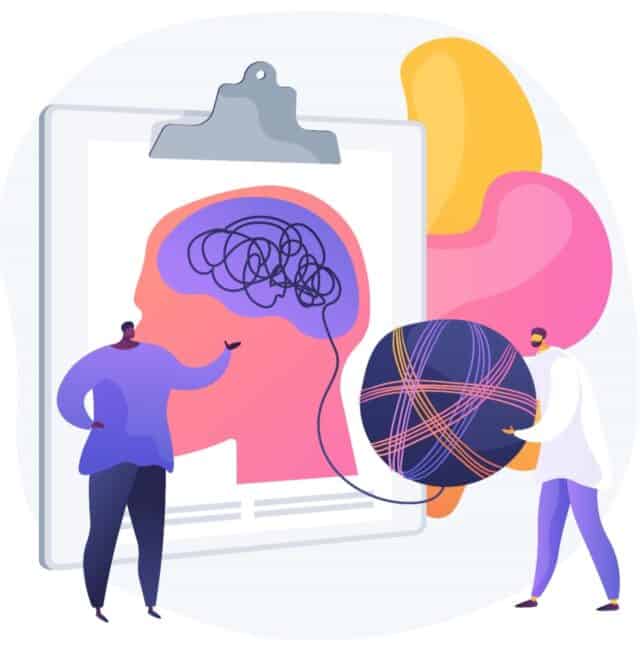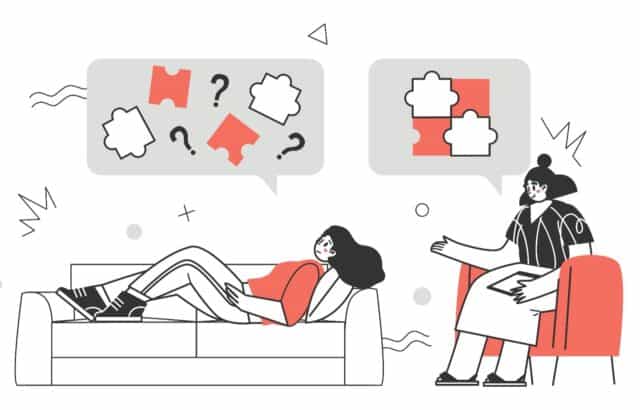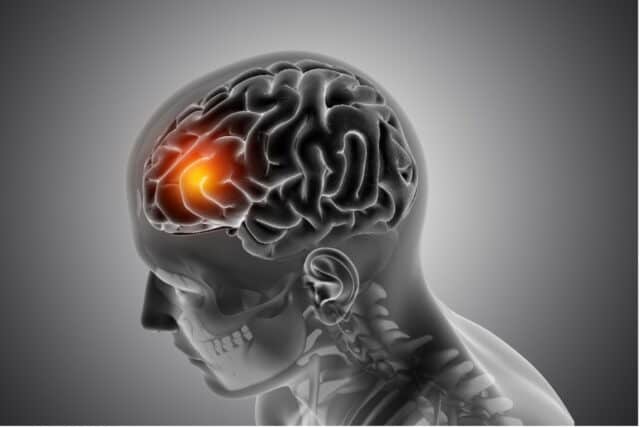
Regardless of which group you belong to, it is imperative to understand the different types of therapy used in
That said, mental illness treatment should be tailored to the individual and involves a multidisciplinary team of mental health professionals. The best psychotherapy for an individual will depend on various factors, including the severity of symptoms, therapy goals, personal preferences.
This article discusses the different types of psychotherapy for mental illness.
What is psychotherapy?

Also known as talk therapy, psychotherapy refers to a vast range of treatments for mental illnesses and emotional difficulties. Essentially, it involves a person speaking with a trained therapist in a safe and preferably confidential environment.
During therapy sessions, therapists help their patients understand certain feelings and behaviours, then provide insights on how they can respond to such challenges, cope with them, and possibly eliminate them.
Psychotherapy may be used alone or with medications or other therapies to treat mental illnesses.
How is psychotherapy helpful?

Psychotherapy can effectively improve symptoms of mental illnesses. The right approach and therapeutic relationship help individuals understand various behaviours, ideas, and emotions contributing to their mental illness and modifying them. Psychotherapy can also help individuals identify and understand events that trigger and contribute to their mental conditions and, with the help of therapists, find and apply techniques that help to process and heal them.
Ideally, psychotherapy helps patients with mental illness develop healthy techniques to help cope and deal with their mentals health conditions.
Different Types of Psychotherapies
There are several approaches that psychotherapists, counsellors and other
With that in mind, here are the different types of therapies for mental illnesses.
1. Cognitive Behavioral Therapy (CBT)

Cognitive-behavioural therapy focuses on uncovering unhealthy, negative thinking and behavioural patterns that cause self-destruction. CBT helps to develop constructive, rational thinking that produces healthier behaviours. Ideally, it involves identifying negative or false beliefs and replacing them with the ability to rationalize the thoughts and
CBT works holistically with a person’s thoughts, feelings, physical sensations, and actions. CBT is based on the foundation that they are connected to each other.
Because CBT helps to change brain activity by exploring change in thinking patterns, this type of therapy can help treat various mental illnesses, including depression, anxiety disorders, eating disorders, schizophrenia, and bipolar disorder.
2. Dialectical Behavior Therapy (DBT)

DBT is an advanced type of cognitive-behavioural therapy developed to treat patients with chronic suicidal thoughts and borderline personality disorder (BPD). DBT therapy emphasizes accepting unhealthy or disruptive thoughts, then formulating a gradual plan for recovery.
In DBT, the therapist’s role is to help the patient find a balance between acceptance and change. DBT teaches patients of mental illness new skills to take responsibility and improve unhealthy thoughts and behaviours.
3. Eye Movement Desensitization and Reprocessing Therapy (EMDR)

EMDR is a brain-based therapy developed to help people who have post-traumatic stress disorder (PTSD). It is a combination of Cognitive Behaviour Therapy and Psychodynamic theory.
Normally, people with PTSD have recurring thoughts, memories, and flashbacks of when they experienced traumatic events. EMDR aims at desensitizing these memories and reframing negative beliefs to positive self-empowering beliefs.
EMDR is included as a protocol to work with PTSD by American Psychological Association.
EMDR works with many issues other than PTSD. It also works with memories that are disturbing the present life.
It is a widely researched therapy for its effectiveness, with fewer sessions required for healing.
The treatment involves a person recalling traumatic events while performing specific eye movements.
4. Brainspotting (BSP)

Brainspotting is a powerful brain-based therapy that reveals a person’s unprocessed traumas through fixed eye positions. It differs from EMDR in that EMDR uses eye movements as a form of bilateral stimulation, while trainspotting focuses the eye on a fixed position.
This type of therapy attempts to reprocess negative thoughts of distressing life experiences by focusing on sensations. It helps to locate neurobiologically, process, and release traumatic experiences and symptoms from the patient’s conscious mind. It helps treat people with PTSD symptoms and other emotionally-based conditions.
Brain-spotting is a brief neurological therapy that works with many issues as stated on… (put our link here)
5. Exposure Therapy

Exposure therapy is a type of CBT used in the treatment of fear and anxiety disorders. It is also commonly used to treat obsessive-compulsive disorder, PTSD, and phobias. During therapy sessions, therapists help patients to identify things that trigger their anxiety and learn how to avoid ritualistic behaviours or becoming anxious when exposed to those triggers.
After learning techniques to avoid anxiety, the person is exposed to whatever triggers them in a controlled environment to implement the learned strategies safely. Implementing various techniques prepares an individual to cope with triggers and apply them to daily life.
6. Interpersonal Therapy
Interpersonal therapy focuses on the behaviours and interactions of a person with others. As the name suggests, this therapy aims at improving the person’s interpersonal skills, especially communication skills. This therapy helps individuals to interact positively with people.
7. Mentalization-based Therapy (MBT)
This therapy involves a technique called mentalizing, which is all about giving sense to self. Therapists help people to understand their own feelings and thoughts and those of others. It has been shown to treat BPD effectively.
8. Psychodynamic Psychotherapy
This type of therapy aims to help a person combat negative behaviour patterns that derive from past experiences. During sessions, therapists ask open-ended questions, which allows them to identify the behaviour and thinking patterns of the patient since early childhood.
Change starts with self-awareness. Psychodynamic psychotherapy helps to identify the past triggers and patterns in a person. A therapist will then assist the patient in overcoming and learning new coping mechanisms and move towards healing.
9. Therapy Pets
This is animal-assisted therapy, where a person spends time with a trained therapy pet. Spending time with these pets can help improve symptoms of depression, anxiety, fatigue, and pain.
Conclusion
Whether you are an aspiring therapist or a potential client seeking the type that suits you best, understanding these types of psychotherapy will help you get the best. Depending on your situation, therapies can significantly improve your
Reference:
Different Types of Therapy [Psychotherapy]: Which is Best For You? | Talkspace
Types of Psychotherapy for Mental Illnesses (webmd.com)
Pets & Mental Health: 15 Benefits of Emotional Support Animals (positivepsychology.com)
This post has been sponsored by Insightful Reflections
Reena Goenka
Reena Goenka is a SAC Registered Counsellor & Supervisor. She is a director of Insightful Counselling & Training. Reena is a caring Mother, an understanding counselor, a healing therapist, a whiz consultant, an expert trainer, and a brilliant writer, holding expertise in Mental health, Psychotherapy treatments, Professional Counseling, and Clinical supervision.


